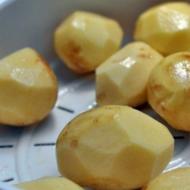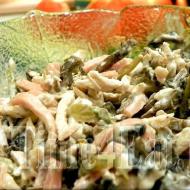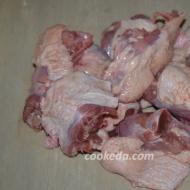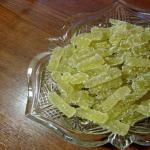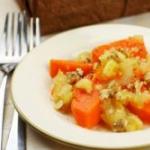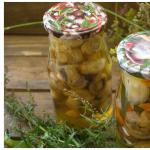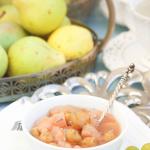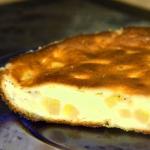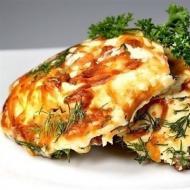
All about dried apricot. Dried apricot What is the difference between dried apricots and dried apricots
Humans have been eating apricots for thousands of years. The aromatic fruits have high taste and are able to quickly satisfy the feeling of hunger, enrich the body with essential vitamins and microelements, and therefore they are indicated for use in a number of diseases.
Apricots have a low calorie content (100 grams of the product contains only 41 kcal), which allows them to be consumed by those who are trying to lose extra pounds.

Fresh apricots contain an impressive amount of plant fiber and beta-carotene, which is considered a powerful antioxidant that prevents the development of cancer cells and heart disease.
Dried apricot: dried apricots, apricots, kaisa - what's the difference
Dried apricots, apricots and kaisa- these are all the names of dried apricots, only dried apricots– these are dried apricot halves from which the pits have been removed; apricot dried apricots– whole, dried fruit with pit; kaisa– dried whole apricot from which the pit has been removed.
Dried apricots, apricots, kaisa – These are dried fruits, for the preparation of which apricot is used. The dried fruit almost completely retains all the beneficial substances and microelements.
And there are plenty of them in apricots. The presence of large amounts of iron and potassium in apricots makes them a universal remedy for the treatment of iron deficiency anemia, many heart diseases and hematopoietic disorders caused by potassium deficiency.
In addition, they stimulate digestive processes, help thin mucus during an unproductive cough, and can be used as a laxative or diuretic.
They are a powerful growth stimulant for children, and also have an excellent general strengthening effect, improve the functioning of the gallbladder, liver and intestines.
The fruits have a stimulating effect on brain processes, which helps improve memory and increase mental performance. 
What are the benefits of dried apricots?
Dried apricot- This is the most delicious and healthy of all dried fruits. It charmed gourmets with its orange color and delicately sweet taste. It is possible to dry apricots with or without pits, but it is difficult to say which of the three types of dried apricots is more popular.
Sunny fruits are especially useful in the autumn-spring period. The beneficial properties of apricot are due to its chemical composition. Dried apricot contains vitamin A, nicotinic and ascorbic acids, B vitamins, magnesium, iron, cobalt, calcium, phosphorus, manganese and copper.
Did you know?100 grams of dried apricots contain 5.2 g of protein, 51 g of carbohydrates and 0.3 g of fat. The carbohydrate component of the fruit is represented by glucose and fructose, which have the ability to be easily absorbed in the intestines and immediately enter the blood. In addition, dried fruits contain fiber, starch, salicylic, citric and organic acids.
The healing potential of dried apricots inspires deep admiration. They are recommended to be eaten by those who suffer from: 
- anemia;
- dystrophy;
- high blood pressure;
- night blindness (hemeralopia);
- diseases of the cardiovascular system;
- constipation caused by intestinal atony.
Modern research has confirmed that systematic intake of these fruits helps lower blood sugar levels. This makes it indispensable for those who suffer from diabetes.
Important! It is especially useful to eat dried fruit for those who have problems with the thyroid gland.
In addition, apricots have a pronounced antibacterial, anti-inflammatory and wound-healing effect, which makes it possible to use a decoction of the fruit for washing wounds, rinsing the mouth for stomatitis and rinsing the eyes for conjunctivitis.
What varieties of apricot are suitable for drying?
Not all varieties of apricots are suitable for drying. When choosing fruits, remember that wild apricots are not suitable for these purposes. Today, about a hundred varieties are known that differ in taste, aroma intensity, fruit size and ripening time.
Preference should be given to varieties that produce large, fleshy and sweet fruits. When choosing a candidate, be sure to pay attention to the taste of the fruit, since it is very important that the fruits do not taste bitter.
 If air drying of apricots was chosen, then they choose late varieties that ripen in mid-summer, since at this time the air temperature is such that the fruits will dry well.
If air drying of apricots was chosen, then they choose late varieties that ripen in mid-summer, since at this time the air temperature is such that the fruits will dry well.
The main thing is that they do not accidentally get caught in the rain.
Drying apricots
Drying apricots allows us to enjoy tasty and aromatic fruits all year round, and not just in the summer. By preparing them for the winter, we provide ourselves with the opportunity to use them for making desserts, fruit porridges and aromatic drinks.
Apricots are harvested in several ways. The main thing is to carry out the procedure correctly in order to fully preserve all the beneficial properties of the fruit, as well as their taste, color and aroma.
Drying apricots with or without pits is a personal matter for everyone. But do not forget that it is much easier to remove the seed from a fresh fruit than from a dried one.
Did you know?To preserve the charming color of apricots, you need to put them for a while in water to which lemon juice has previously been added. After you remove the fruits from the water, they must be allowed to dry thoroughly.
There are several options for drying fruits, each of which has its own advantages and disadvantages.
 Apricots can be dried on open air. This method can only be used for drying fruits of those varieties that ripen in mid-summer, since berries obtained from early ripening varieties ripen at a time when the ambient temperature is not yet high enough, and therefore there is a possibility of mold damage to the crop.
Apricots can be dried on open air. This method can only be used for drying fruits of those varieties that ripen in mid-summer, since berries obtained from early ripening varieties ripen at a time when the ambient temperature is not yet high enough, and therefore there is a possibility of mold damage to the crop.
Drying apricots is especially popular among gardeners. in the oven, which provides the garden owner with complete independence from weather conditions and nature’s favor. Drying apricots is also incredibly convenient. in an electric dryer or their freezing.
Drying apricots in the sun
To dry apricots in the sun, fresh, not overripe fruits that are not damaged are selected. The fruits are thoroughly washed and the seeds are removed.
Important!To preserve the color of the fruits, they are soaked for 10 minutes in a solution of citric acid, prepared at the rate of 8 teaspoons of citric acid per liter of water.
Place the fruits in a colander and let drain. After the water has drained, place the apricots in a single layer, cut side up, on the wire rack so that the halves do not touch each other.
We take the fruits out into the hot sun and leave them for 3 or even 4 days. After the specified time has passed, we bring in the grates and lay the fruits in a denser layer, after which we leave them in the shade until completely dry.
Drying apricots in the oven
 For this method, we select apricots according to the same criteria as for drying in the sun. Remove the seeds from the fruit and place in a colander.
For this method, we select apricots according to the same criteria as for drying in the sun. Remove the seeds from the fruit and place in a colander.
At the next stage, immerse the apricots in a boiling soda solution for 10 seconds (add 1.5 teaspoons of baking soda to 1 liter of water). After boiling water, immediately lower the fruits into cold water for a few seconds.
Let them drain. Then we place the fruits on a baking sheet with the cuts facing up so that they do not touch each other, and put them in the oven.
Did you know?Apricots are dried for almost 8 hours at a temperature of about 65 degrees, while the oven door should be slightly open. Towards the end of drying, reduce the temperature in the oven to 40 degrees.
After drying, put the fruit in a wooden container and hide it for 3-4 weeks in a dark, well-ventilated place to stabilize the humidity.
Drying apricots alternately in the sun and in the oven
Another popular way to prepare dried apricots for the winter is to dry the fruits together in the oven and in the sun. First, the fruits are soaked for 10 minutes in a solution of citric acid, after which they are dried, laid out on wire racks and placed outside.
After four hours, they are brought into the room and dried for another four hours in the oven at a temperature of about 60 degrees.
Drying apricots in an electric dryer
 Ripe but not overripe fruits are washed and their seeds are removed. Then we place the fruits on the trays of the electric dryer, cut side up, so that they do not touch each other.
Ripe but not overripe fruits are washed and their seeds are removed. Then we place the fruits on the trays of the electric dryer, cut side up, so that they do not touch each other.
Place the dryer in a well-ventilated room and turn on the device at medium temperature. The drying process lasts from 10 to 14 hours and depends on the size and juiciness of the fruit.
How to properly store dried apricots
It is important not only to properly dry, but also to properly store dry apricots.
Important!To preserve dried fruits for the longest possible time, they will need to be placed in gauze bags and hung in a cool and well-ventilated room with a minimum level of humidity and an air temperature of no more than 10 degrees.
If this is not possible, then dried apricots should be stored in paper bags or glass, tightly closed jars, which will need to be opened periodically for a short time for ventilation.
How to make candied apricots
 Making candied apricots is easy. To do this, select slightly unripe, undamaged hard fruits, rinse them under running water and allow them to drain.
Making candied apricots is easy. To do this, select slightly unripe, undamaged hard fruits, rinse them under running water and allow them to drain.
Now you should remove the seeds from them and blanch the fruits for a few seconds in boiling water. Immerse the fruits in cold water for a few minutes, and only after that soak the apricots in syrup, prepared at the rate of 250 grams of water 1.3 kg of sugar.
The fruits should be boiled in syrup three times for five minutes. After each cooking, let the fruits cool well. After the last cooking, place the fruits in a colander and let them drain.
Place the fruits on a baking sheet and dry them in the oven at 40 degrees until they are covered with sugar crystals.
How to freeze apricots for the winter
Many housewives prepare strawberries, currants, raspberries, and some other types of berries for the winter. At the same time, they stubbornly ignore apricots. And in vain!
This is a very tasty and healthy fruit that contains a huge amount of vitamins and microelements.
Important!Apricots are most often prepared for the winter in the form of jam, compotes or drying, but they forget that freezing apricots allows you to preserve all the beneficial properties of this fruit unchanged.
 Apricots can be frozen whole, in halves, with sugar or in sugar syrup. Each of these methods is good in its own way. But so that you can choose the most suitable option for yourself, let's take a closer look at each of them.
Apricots can be frozen whole, in halves, with sugar or in sugar syrup. Each of these methods is good in its own way. But so that you can choose the most suitable option for yourself, let's take a closer look at each of them. Freezing whole apricots
If you don’t have the time or desire to bother with pitting, you can freeze the apricots whole.
With bones. It has many healing properties and contains many nutritional components. It is consumed natural, fresh and dried.
The shelf life of the dried product is longer than that of the fresh product, and it has a unique taste.
Exists several types of dried fruits:
 Dried apricots contain lots of dietary fiber, a few pieces of dried fruit can maintain normal fiber levels. The fruit is considered the record holder for potassium content among dried fruits. It also includes the following useful material:
Dried apricots contain lots of dietary fiber, a few pieces of dried fruit can maintain normal fiber levels. The fruit is considered the record holder for potassium content among dried fruits. It also includes the following useful material:
- proteins;
- water;
- fats;
- ash; alimentary fiber;
- carbohydrates;
- alpha tocopherol;
- thiamine;
- ascorbic acid;
- riboflavin;
- niacin;
- beta-carotene;
- potassium;
- sodium;
- calcium;
- magnesium.
This product can be added to a weight loss program; it contains complex carbohydrates, which have the ability to suppress hunger for a long time and stimulate intestinal function. When consumed in small quantities, saccharides are converted from fats into energy. From this, a person begins to feel a surge of vigor and strength.
 The main difference between apricots and dried apricots is fruit preparation technology, dried apricots have a seed. But it also has other differences:
The main difference between apricots and dried apricots is fruit preparation technology, dried apricots have a seed. But it also has other differences:
- Apricots are more popular and known than dried apricots. According to popular beliefs, the seed cannot be removed from the fruit, so as not to deprive it of its natural part.
- Usually the fruit with the stone is dried directly on the trees and is not subjected to chemical or thermal treatments. This makes it considered an environmentally friendly product for consumption and cheaper.
- Dried apricots contain fewer nutrients and have mainly only laxative properties.
 The dried fruit contains a large amount of potassium. It improves the function of blood vessels and normalizes the contractility of the heart muscle. It also contains dietary fiber, which can combine harmful toxins and increase the volume of feces. Dried apricots have the following properties:
The dried fruit contains a large amount of potassium. It improves the function of blood vessels and normalizes the contractility of the heart muscle. It also contains dietary fiber, which can combine harmful toxins and increase the volume of feces. Dried apricots have the following properties:
- neutralize the effects of free radicals;
- strengthen the capillary wall, stimulate hemoglobin synthesis, improve blood counts, prevent the development of anemia, prevent blockage of veins;
- prevent cell mutation, improve cellular respiration;
- relieve excitement of the central nervous system, increase mental activity;
- normalize the condition of blood vessels, increase oxygen supply to the myocardium, reduce blood pressure;
- improve the functions of the stratum corneum, increase visual acuity;
- transform fat into energy, accelerate the removal of excess fluid from the human body
- strengthen bone tissue, normalize smooth muscle contraction processes;
- reduce pain during migraines.
To obtain a healing effect, you need to consume 150 grams of apricots in the first half of the day.
 In complex therapy, apricots are useful for the following diseases:
In complex therapy, apricots are useful for the following diseases:
- avitaminosis;
- anemia;
- arrhythmia, angina pectoris, heart failure, heart attack;
- arthritis, polyarthritis, arthrosis, osteoporosis, osteochondrosis, radiculitis, joint rheumatism;
- myopia, astigmatism;
- bronchitis, whooping cough, tracheitis;
- hypertension;
- headache, migraine;
- depression, neurosis;
- constipation;
- thrombophlebitis, vascular dystonia.
Antioxidants protect the body from inflammation, prevent the development of cancer, and protect cells from premature aging. With regular use, the dermis and epidermis will be renewed, elastin and collagen will be produced, skin health will be restored, and the body will get rid of toxins.
Nutrients strengthen the cardiovascular system, improve the elasticity of the walls of blood vessels and cleanse them of fatty plaques, and lower cholesterol levels. This is a good remedy for the prevention of cardiovascular diseases.
Vitamins A, C and E increase and strengthen the immune system; it must be taken during periods of epidemics and if you are prone to colds. Compotes, decoctions and teas remove bacteria and harmful substances from the body and help fight symptoms.
Tea, compote or infusion of this dried fruit restores the functioning of the intestines and digestive system, regulates stable cleansing, and supports microflora. Uruk removes excess liquid and relieves swelling.
Apricots are also good for brain function. With high mental stress, you can use this fruit as a separate snack or prepare light desserts.
Uruk is a very healthy dried fruit, but it has its contraindications. There are contraindications for people who are hypersensitive to beta-carotene. People with chronic pathologies of the digestive tract, diabetes, and low blood pressure should use it with caution.
 Pour dry fruits into a glass, and then pour them into an enamel bowl, pour a liter of boiling water and cover with a lid.
Pour dry fruits into a glass, and then pour them into an enamel bowl, pour a liter of boiling water and cover with a lid.
The dishes should be wrapped warmly and the apricots should be infused for 15 hours.
After this, the resulting compote must be strained, the swollen berries are eaten, and the liquid is drunk during the day. This infusion useful for hypertension and constipation.
 If you purchase packaged products, pay attention to the labeling. When treated with chemicals, the packaging will be marked E220 - this is sulfur dioxide.
If you purchase packaged products, pay attention to the labeling. When treated with chemicals, the packaging will be marked E220 - this is sulfur dioxide.
How to choose by appearance:
- External surface. The peel should be wrinkled and free from mold and defects.
- The color should have an inconspicuous appearance - the peel is wrinkled, matte, brown. With a shiny bright orange surface that is translucent in the light, this indicates that the product has been treated with sulfur dioxide.
- The structure of the dried fruit pulp should be dense and elastic; when pressed, it should not stick and release juice.
- The smell of natural apricots has an unobtrusive aroma of apricot without foreign impurities. Artificial fruits will smell like chemicals and soot.
- Natural apricots, which have ripened on the tree, have a sweet and sour aromatic pulp. If the fruits have a sugary honey center, it means they have been treated with sugar syrup.




Uryuk is an apricot with a pit that has ripened on the branches of a tree and has a rich healing composition. Used for medicinal purposes, in cooking and cosmetology. Only a high-quality product that has not been treated with chemicals can bring benefits.
Apricots are dried apricot fruits containing the pit. Unlike other dried fruits, it is collected ready-made from the branches of the tree. Drying occurs naturally under the influence of sun and wind. As a result, the fruit retains the maximum amount of vitamins and other nutrients.
Uryuk - healing properties and uses
Types of dried fruits from apricots
Uryuk is not the only dried fruit that is obtained from apricots. Dried apricots and kaisa are also its varieties. How are they different? Let's find out in more detail what kaisa, apricots and dried apricots are, what they look like, and what fruits they are made from.
So, there are three types of dried apricots:
dried apricots; dried apricots; kaisa.
Dried apricots are dried apricot halves. Depending on the method of production, it can be either bright yellow or dark orange or brownish. Fruits with a pale color have the greatest benefits. It is evidence that no chemicals were used in the production of dried fruits. This is what natural dried apricots look like:
Natural dried apricots darken when dried and have a faded, brownish-orange color.
And this is a product in the production of which chemicals were used:
Bright, shiny dried fruits are obtained by treating them with sulfur dioxide or other preservatives.
Dried apricots are dried on an industrial scale using a special chamber or on racks in the open sun.
Uryuk is a dried apricot with a pit. It is obtained from small fruits dried directly on the branches of a tree. It is then sorted and sent for sale. They are not subjected to any further processing and are immediately ready to eat. This is what a freshly harvested apricot looks like:
Natural apricots, dried without preservatives, look unpretentious, but these dried fruits are considered especially beneficial for health
The absence of any chemical or thermal treatment of the fruit ensures maximum preservation of useful substances in it. At the same time, it has a fairly long shelf life, since the integrity of its skin is not compromised.
Sometimes you may find seedless apricots on sale. However, despite its similarities, it is actually a completely different type of dried fruit called kaisa. The technology for harvesting it is very similar to obtaining dried apricots, with one small exception - the fruit is not cut before drying, but the seed is squeezed out of it.
Apricots and dried apricots, unlike kaisa, are often found on sale, so everyone more or less knows what they look like. What is kaisa?
This dried fruit is very similar to dried apricots, so they are often confused, but upon closer examination the difference becomes obvious. The kaisa has a hole inside that remains after the seed is extracted. Dried apricots are only half of the fruit and do not have such a cavity. This is what the kaisa looks like:
Kaisa is often confused with apricots or dried apricots, but it is a separate type of dried fruit obtained from apricot
Interesting fact! It is believed that the birthplace of apricot is Armenia. It is not for nothing that the old botanical name of this fruit sounds like “Armenian Apple”.
TREAT THE CAUSE, NOT THE EFFECT! Product made from natural ingredients Nutricomplex restores proper metabolism in 1 month. Read the article>>...
The benefits of apricots
The indigenous people of Central Asia call apricots a divine gift. Women know it as the fruit of beauty. And in Tajikistan they even make an elixir of longevity from it. Why is he so famous? Its chemical composition will help us find out why Asians value apricots so much, what are the benefits and harms of this dried fruit.
Composition of apricots
Uruk has a chemical composition very rich in useful substances. It contains:
vitamins – C, A, PP, E, B, beta-carotene; macroelements – phosphorus, calcium, potassium, sodium, magnesium; microelements – iron; essential and essential amino acids – arginine, valine, leucine, isoleucine, phenylalanine, tryptophan, glycine, serine, alanine;
sugars – fructose, glucose, sucrose; saturated and unsaturated fatty acids; proteins; fats; carbohydrates.
Among vitamins, apricots are especially rich in tocopherol. Its content often reaches 6 mg per 100 g of product weight. There is also a lot of ascorbic acid - about 4 mg. B vitamins are represented mainly by thiamine and riboflavin.
Of the minerals, potassium is especially noteworthy. Uryuk is a record holder for its content - as much as 1800 mg per 100 g of dried fruit. There are also macroelements necessary for human health such as phosphorus, calcium and magnesium. It contains only 3.2 mg of iron, however, this amount is quite enough to cover a quarter of the daily requirement.
As for nutritional value, apricots will give a few points of advantage to many other types of dried fruits. 100 g of product contains 242 kcal. However, this does not mean that overweight people cannot eat apricots. The high calorie content of this dried fruit does not prevent them from losing weight with its help. The thing is that the lion's share of calories comes from carbohydrates, which are quickly absorbed in the human body, causing a feeling of fullness. At the same time, they are not stored as excess fat, but are broken down, releasing a large amount of energy. This feature allows even diabetics to eat apricots, of course within reasonable limits and after prior consultation with a doctor.
Dried apricot fruits contain a lot of potassium, vitamins and other useful substances
Therapeutic effect
Due to its rich chemical composition, apricots have the following beneficial properties:
diuretic restorative laxative expectorant hypotonic antioxidant antitumor tonic vitaminizing.
For overweight people, it will be useful information to know that apricots speed up cellular metabolism and help burn extra pounds. For headaches, it has an analgesic effect and strengthens blood vessels. For anemia – promotes the production of red blood cells, improves blood quality. Apricots also help relieve stress and stimulate digestion. It has a general rejuvenating effect on the human body, prevents the development of cancer cells, normalizes digestion, relieves swelling, and improves vision.
Advice! When purchasing, pay attention to the color of the apricot. The bright, shiny color of the dried fruit will indicate its unnaturalness. It is better to give preference to faded, dark fruits.
Application in medicine
The healing properties of apricots have not gone unnoticed by doctors. It is used in the treatment and prevention of a wide variety of diseases. Cardiovascular diseases, intestinal disorders, colds, flu, nervous diseases - this is just a short list of ailments for which it is used.
Indications
Apricots, both dry and in infusion, are useful for the following diseases:
migraine; hypertension; anemia; avitaminosis; oncology; thrombophlebitis; constipation; depression; neuroses; vascular dystonia;
asthma; bronchitis; diabetes; osteoporosis; anemia; intestinal disorders.
Women will also be interested to know that apricots slow down the aging process and strengthen the structure of hair and nails. For old people, it prolongs life and maintains clarity of mind. The so-called long-livers drink is made from it, which is a water infusion of dried apricots. It is believed that regular use of this elixir can extend life to 120 years.
Regular consumption of apricots can relieve frequent headaches
Contraindications
Apricots have not only beneficial properties, but also contraindications. In particular, it should not be eaten by people with hypersensitivity to plant pigments. Simply put, with an allergy to brightly colored orange or red fruits. This is especially true for young children. It is also not recommended to abuse this dried fruit for the following diseases:
hypotension; severe stage of diabetes; individual intolerance.
You should use apricots with caution when breastfeeding, as they can cause weakening of the baby’s intestines. People prone to overeating and diarrhea should also not eat it.
Why apricots are useful, how to use them and choose them, watch this video:
Are you one of those millions of women who struggle with excess weight?
Have all your attempts to lose weight been unsuccessful?
Have you already thought about radical measures? This is understandable, because a slim figure is an indicator of health and a reason for pride. In addition, this is at least human longevity. And the fact that a person who loses “extra pounds” looks younger is an axiom that does not require proof.
|
Apricots are one of the healthiest fruits. Several types of products are made from these fruits: dried apricots, kaisa and apricots. They differ from each other in the method of processing and drying. The apricot is distinguished by the fact that it remains on the tree in its entirety until it gives up all its moisture. Due to this, it is believed that this product contains the largest number of microelements, and the beneficial properties of apricots have been known to many peoples for many centuries. Composition and calorie content of apricotsAmong the chemical components of this product are potassium, carotene, calcium, phosphorus, sodium, iron, vitamins B5, A, E, C and B. 100 grams of apricots contain 213 kcal, 5 grams of protein, 0.4 grams of fat and 50.7 grams of carbohydrates. This makes this product a very nutritious, quickly digestible and high-energy product. By eating several dried fruits in the morning, you gain a boost of energy and regulate your metabolism. Useful properties of apricotsApricots are useful for many of their properties. First of all, it is used as a prophylactic for indigestion. Magnesium regulates metabolic processes in the body and intestines, which leads to normalization of the digestive system. Also, apricots are able to normalize blood pressure, so it is often recommended to be consumed by hypertensive patients and people with diseases of the cardiovascular system. The benefits of apricots have long been known to women as a fat-burning product. Despite the fact that this product contains a lot of carbohydrates and sugars, on the contrary, they promote weight loss, as they lead to rapid saturation of the body. Consequently, the person does not overeat, and the metabolism returns to normal. Beta-carotene, contained in apricots, also perfectly combats the problem of vision impairment. It is recommended to use it with something fatty (with sour cream, for example), since it is in this combination that this vitamin begins to be absorbed by the human body. The ability of apricots to accelerate metabolic processes in cells gives a rejuvenating and strengthening effect. Blood composition also improves, and therefore this product is prescribed for anemia and anemia. Daily consumption of 100 grams of this product helps prevent cancer. For people suffering from edema, apricots will help remove excess water from the body, as it has a diuretic effect. Sour varieties often help in the fight against migraines and colds. Sweet fruits have a positive effect on the central nervous system and help cope with nervous disorders. You can effectively fight a cough with milk from apricot seeds, and tea from these seeds has a beneficial effect on the heart. Thanks to its rejuvenating properties, this fruit promotes skin renewal. Harm of apricotsOne of the most common contraindications is an allergy to beta-carotene. Those who have already monitored allergic reactions to apricots or dried apricots should absolutely not eat apricots. You should try this product with caution if you are allergic to orange foods. The benefits of apricots (video) |
Beneficial properties of apricots used for treatment
Scientists have found that apricots help with poor circulation and anemia, and promote rejuvenation, overall strengthening of the body, and improved vision. Varieties of sour apricots are excellent for relieving migraine attacks and colds, and sweet varieties of apricots are useful for those who suffer from nervous and mental disorders.
Those with high or low blood pressure need magnesium salts found in dried apricots. Doctors prescribe magnesium diets for such patients, which are based on the consumption of apricots.
The apricot is called the “fruit of beauty.” It maintains the tone of hair, nails and skin, makes bones stronger. The diuretic properties of apricots are useful for the treatment of diseases of the genitourinary system and the prevention of cancer.
Apricot seeds are the raw material for medicinal milk, which is used to relieve coughs, whooping cough, tracheitis and bronchitis.
Tea made from dried apricot seeds is beneficial for cardiovascular diseases, and raw seeds remove worms.
Dried apricots are very useful for people with thyroid diseases and diabetes.
Infusion of apricots
In the Central Asian republics, an infusion of apricots is called the elixir of longevity. You can prepare it according to the Tajik recipe as follows. Take a few pieces of wild apricots, the trees of which grow on mountain slopes. In the evening, soak in clean water. In the morning, drink water and eat apricots.
Aksakals claim that if you start having breakfast like this every morning, you can live to be over a hundred years old, without illness and in your right mind.
In other republics, the elixir of longevity is prepared differently. In the evening, pour a glass of dried apricots into the pan. Add a liter of boiling water there. Cover the container with a lid. After about a day, filter the contents of the pan. The swollen apricot berries are eaten and the infusion is drunk several times a day.
Local residents claim that this can cure colitis and hypertension. These are the beneficial properties of apricots.
Dried apricots. Composition, beneficial properties of apricots. Infusion of apricots
Composition of apricots
Available in Uruk
Useful properties and treatment of apricots
Infusion of apricots
Unfortunately,
Uryuk in cooking
Pilaf and fillings with apricots
The most famous dish is pilaf
Cottage cheese with apricots
Uryuk - calorie content and properties. The benefits and harms of apricots
Calorie content: 242 kcal.
Energy value of the product Uryuk (Ratio of proteins, fats, carbohydrates):
Proteins: 5 g (~20 kcal) Fats: 0.4 g (~4 kcal) Carbohydrates: 53 g (~212 kcal)
Energy ratio (b|w|y): 8%|1%|88%
Uryuk: properties
How much does Uryuk cost (average price per 1 kg)?
Moscow and Moscow region.300 rub.
Apricot is the fruit of the apricot tree, dried together with its pit. Central Asia and Dagestan are considered to be the homeland of these trees. It is necessary to remember that there are several types of dried apricot, only three: dried apricots, apricots and kaisa. Apricot is different in that it is a whole dried fruit, and in some cases this happens naturally with the help of the sun and people simply pick it from the tree. Almost all peoples perceive apricots only as an ordinary sweet, a dried fruit that can be added to various porridges, however, the indigenous inhabitants of Central Asia believe that the apricot, and not dried apricots or kaisa, has some healing properties and it contains the secret of longevity.
Residents of Central Asia perceive apricots as a gift from Allah; they value this fruit very much. It is often used in various culinary dishes not only to impart certain taste qualities, but also to give the desired color to the dish, that is, they act as a natural dye. In Russia, apricots are not as common as dried apricots, which is probably due to the fact that the fruit is dried together with the seed and eating it causes some inconvenience. When buying apricots at the market, you should pay attention to its color; if it is bright, it means the fruit has been chemically treated for the sake of its “marketable appearance,” so it is better to choose more or less inconspicuous fruits.
The benefits of apricots
The benefit of apricots lies primarily in the fact that they contain incredibly useful substances, minerals and vitamins. It is not for nothing that it is so often used in Central Asia when preparing any dish; the beneficial properties of apricots also appear in combination with other products; they do not interfere with this. You can be sure that the benefits of apricots will be noticeable even when eating traditional Asian pilaf; apricots are added there not because of its taste, but because of its color; it helps the dish become exactly the shade that the cook needs. Thus, apricot acts as an alternative to expensive saffron. The beneficial properties of apricots have prompted people to add it to various lamb dishes, as well as to add it to sauces and drinks.
Apricot compote is considered very useful, especially if it is combined with some other dried fruits. Apricots contain a special wealth - carotene, which, when entering the human body, undergoes an interesting transformation and becomes vitamin A, which is very useful for vision and skin. Also, apricots contain potassium salts, this substance is absolutely indispensable for diseases of the cardiovascular system. The calorie content of apricots is quite high, about 242 kcal per 100 grams, so consuming this product in the morning will give you a large amount of energy for the whole day. Dietary fiber, which is included in the chemical composition of the product, helps remove harmful toxins from the body.
Harm of apricots
The harm of apricots is a rather relative concept. Apricots can only cause harm to the body if you eat too much of them, since the product is rich in carbohydrates and fiber, and weight gain may occur.
Product proportions. How many grams?
1 piece contains 25 grams
The nutritional value
Is apricot good for everyone?
Having found out the meaning of the word “apricot” (dried apricot fruit with pit) and its beneficial properties, many may ask a logical question about whether everyone can consume this product without fear. In answer to this, it should be noted that it is advisable to eat such dried fruit with extreme caution for those who have low blood pressure. Moreover, if you consume apricots in large quantities, a person may experience diarrhea. For this reason, it is not recommended for breastfeeding women. Although some people use the laxative property of this product to their advantage and successfully get rid of severe constipation.
Among other things, due to the increased calorie content and the huge amount of elements such as carbohydrates and fiber, apricots can be harmful for people who suffer from obesity.
It is also worth noting that during the production of this product it is very often treated with sulfur. This fact clearly does not benefit the body. After all, not a single person has ever felt better from eating fruits or vegetables with a high content of chemicals. That is why when buying apricots, you should distinguish between a processed product and a natural one. So, if you come across a beautiful bright orange dried fruit (sometimes even glossy), then it’s better not to buy it. After all, healthy dried apricots without any carcinogenic substances should have a dark brown tint.
Use in cooking
Uryuk - what is it? We gave a comprehensive answer to the question asked at the very beginning of this article. Now I would like to talk about exactly how this ingredient is used in cooking.
In Eastern countries, apricots are considered a product of longevity. Based on it, the so-called “elixir of a long-liver” is prepared. To do this, you need to take a few berries, wash them well, and then fill them with clean water and leave them overnight. In the morning, the resulting infusion should be drunk on an empty stomach, and the soaked fruits should be eaten as a first breakfast. Using this drink every day, you will very soon notice how your health improves, a positive attitude and good spirits appear.
It is also worth noting that in eastern countries, seedless apricots are often used to prepare tasty and nutritious pilaf, to add it to various sauces, cereals and drinks (kvass, tea, liqueur, compote, tinctures, etc.). In addition, this dried fruit serves as an excellent sweetener and flavoring for home baking. And for those who suffer from constant excitability and nervous disorders, experts recommend eating a few pieces of regular dried apricots every day.
Application in medical practice
The brownish-orange color of this product indicates that it contains a lot of beta-carotene. As is known, this substance prevents the development and proliferation of cancer cells. In addition, apricots contain a lot of potassium, which is necessary for the body to:
have an antisclerotic effect; maintain normal contraction of the heart muscle; prevent cell mutation.
One cannot ignore the fact that apricots are rich in fiber. That is why its use significantly improves intestinal motility and speeds up the process of digested food passing through it.
Knowing about the medicinal properties of “milk”, which is extracted from apricot seeds, experts recommend using it in the treatment of cough, as well as bronchitis and whooping cough. In addition, doctors always advise eating apricots to prevent hypertension and thrombosis, for the treatment of diabetes, diseases of the thyroid gland and cardiovascular systems.
Application in cosmetology
The set of vitamins, macro- and microelements contained in apricots helps the fair sex maintain the beauty of their skin, nails and hair. To do this, you should not only consume the dried fruit internally, but also use it to create various masks, tinctures for washing, etc. Often, apricots are used as a natural ingredient for soap, which can be easily prepared at home. After all, this dried fruit gives the detergent not only a delicate and beautiful shade, but also a sweetish aroma of the south.
Meadowsweet beneficial properties and contraindications Pomegranate fruit beneficial properties Rice beneficial properties and contraindications Rowan berries beneficial properties Chokeberry useful properties and contraindications Aspen bark beneficial properties and contraindications Beneficial properties of fats Green peas beneficial properties Nettle beneficial properties Beneficial properties of cinnamon for weight loss Walnut partitions beneficial properties Wheatgrass beneficial properties properties and contraindications Kudin beneficial properties Marmalade beneficial properties Tolkan beneficial properties
Beauty and Health Health Nutrition
Residents of central Russia roughly know that apricots are a type of dried apricots. Apricots are useful, and many doctors, various specialists in the treatment of certain diseases, as well as nutritionists recommend including them more often in your diet: in any form - fresh or dried. However, what is the difference between different types of dried apricot fruits, and which type is healthier?
Types of dried apricots: dried apricots, apricots and kaisa
Dried apricots are divided into three types: dried apricots - dried fruit halves; kaisa – whole dried apricots. In these species, the bone is removed before drying, and they are dried in various ways, including using chemicals.
And only the third type - apricots - contains a seed, because it is dried under natural conditions: the fruits are left on the tree until they completely lose water. It is clear that in this case they retain everything valuable and useful that Mother Nature gave apricots: vitamins, minerals, sugars, organic acids, etc.
Dried apricots and kaisa, unlike apricots, dry out without having a connection with the tree, on which they grew up, therefore less nutrients are retained in them. The integrity of the fruit is also important: the apricot is not cut and its structure is not damaged. Small apricots are usually dried for apricots., and large ones are used to prepare other types of dried fruits.
All dried apricots have high nutritional value, and are also considered a natural fat burner - even though they are sweet. However, the indigenous inhabitants of Central Asia, especially Uzbeks and Tajiks, are convinced that apricots are the only type of dried apricots that have healing properties, and they always use them for the treatment and prevention of various diseases, for beauty, health and longevity.
They consider other types simply sweets, and at the same time they know what they are talking about. There are quite a lot of calories in apricots - about 240 per 100 grams, but they are not dangerous for the figure - if you do not abuse them. Apricots contain vegetable protein, fats and many healthy complex carbohydrates - these carbohydrates are perfectly digestible, but do not turn into fat, as they cause a long feeling of satiety; Dietary fiber promotes better bowel function and removes toxins from the body.
Composition of apricots
Available in Uruk organic acids, simple and complex sugars, saturated and unsaturated fatty acids, vitamins - beta-carotene, A, C, E, group B; minerals - calcium, magnesium, sodium, potassium, phosphorus, iron.
The nutritional value of apricots is due to their high sugar content., and it contains a lot of potassium, which is why it is so useful for those prone to cardiovascular diseases and difficult digestion. B vitamins give us energy - they are especially necessary for women, as they also help burn calories and prevent obesity.
For anemia and circulatory disorders, apricots are also useful; Experts recommend using it regularly for poor eyesight as a general tonic and rejuvenating agent.
Apricots contain magnesium salts, which makes them a cure for hypertension.– blood pressure gradually returns to normal with its regular use. There are even special magnesium diets with apricots - for hypertension and certain forms of anemia resulting from poor nutrition.
In addition, in those regions where apricots are constantly present in the diet, residents have very few fractures, since it strengthens bone tissue, and the skin and hair are always in order.
Eating apricots prevents the development of cancer– at least several times reduces the likelihood of disease. To do this, it is enough to consume about 100 g of these dried fruits per day.
Like dried apricots, apricots have a diuretic effect, its decoction relieves swelling, is useful for patients with diabetes - unsweetened varieties.
In Central Asia, residents consider apricots to be a gift from Allah - fairy tales and poems have even been written about its benefits and healing properties.
Infusion of apricots
In Tajikistan there is a recipe for longevity: several pieces of wild mountain apricot are soaked in clean water in the evening - no need to heat it. In the morning you need to eat apricots and drink water. They say that you can live up to 120 years this way, without knowing illness and maintaining a clear mind, and besides, such a breakfast is very tasty.
You can prepare apricot infusion differently: a glass of fruit is poured with a liter of boiling water in an enamel pan, closed, wrapped warmly and left for about 15-20 hours. The resulting infusion is filtered and drunk several times a day for hypertension and constipation, and the swollen berries can be eaten separately. It is better to take apricots of the Isfarak or Kandak variety.
How to choose and use apricots
As already mentioned, apricots have a beneficial effect on skin and hair.: it rejuvenates the skin and strengthens the hair, and therefore it is called the “fruit of beauty.”
Apricot “milk”, obtained from apricot seeds, helps relieve coughs from bronchitis, tracheitis and whooping cough, relieves hiccups and some types of inflammation.
It is good for people suffering from cardiovascular diseases to drink tea from apricot seeds; raw seeds help get rid of worms.
It’s difficult to buy real tree-dried apricots today.: it can cost 1000 rubles per kilogram or more, but that’s not the point - it’s just that there are often fakes on the market. Fruits are dried in special chambers, and at the same time they are fumigated with sulfur dioxide - this is not prohibited, but often causes allergies. Therefore, it is better to buy apricots, like dried apricots or kaisa, not bright and beautiful, with a pronounced golden color, but dull, reddish - in general, unsightly in appearance - in this case you can be sure that at least it has not been treated with chemicals.
Unfortunately, It’s not a fact that an expensive apricot will turn out to be “real”- the same one that is made from wild apricots. It turns out that these varieties have survived only in Kazakhstan, and a little in Uzbekistan, Kyrgyzstan and China - in other regions of the planet they do not grow, and their number is constantly decreasing. Wild apricots are listed in the Red Book and are under protection, and apricot compote today can only be drunk in the regions of its natural growth.
If you are lucky enough to buy a genuine apricot, perhaps in Central Asia or just at the market, then try to make the most of its healing properties. Apricots are not widely used in cooking, but dishes made with them are tasty and healthy..
Pilaf and fillings with apricots
The most famous dish is pilaf. Well-washed apricots are placed in an even layer on the zirvak, and rice is poured on top. There is no need to mix the ingredients, and then the pilaf is prepared like Uzbek. In addition to rice and apricots, beef (lamb), carrots, oil or fat, spices and salt are usually used.
Apricots make an excellent filling for pies and pies.. Dry fruits are sorted, washed, placed in a saucepan, filled with warm water and left to swell. After 30-40 minutes, the water is drained, the apricots are slightly dried, the seeds are removed and passed through a sieve. Add sugar to the resulting mass and mix, and then put it in the refrigerator for 10-15 minutes to thicken a little. For 1 kg of apricots you will need 200-250 g of sugar.
For hypertension, heart and kidney diseases, dishes with apricots and dairy products are useful.
Cottage cheese with apricots
To prepare cottage cheese with apricots you need 500 g of cottage cheese and 150 g of apricots, a glass of nuts (almonds, hazelnuts), 2 eggs, 0.5 cups of flour, 3 tbsp. butter, 1/3 cup sugar and salt to taste.
Crush the nuts, mix with chopped apricots; Rub low-fat cottage cheese through a sieve, add flour, sugar, melted butter, yolks, and beat everything. Then combine everything, add the whipped egg white and knead gently. Place the mixture in a greased pan and bake in a moderately preheated oven. Serve topped with sour cream.
Another dietary dish is casserole with apricots and pumpkin. Peeled and cut into small cubes pumpkin is fried in melted butter, chopped apricots are added, poured with milk sauce, sprinkled with crushed breadcrumbs and baked. Apricots – 80 g, pumpkin – 150 g, milk – 60 g, flour and sugar – 5-10 g each, butter – 20 g, crackers – 5-10 g.
Dried fruits contain a lot of valuable minerals, vitamins, organic acids, and dietary fiber. In winter, such a dish will strengthen the immune system in the best possible way. One of the most common types of dried fruits is dried apricots - dried apricots. The product is added to baked goods and consumed as an independent snack. Many people are interested in what benefits and harms the orange fruit can bring? Let's talk about everything in order.
What is dried apricots
Dried apricots are dried apricots. The product is considered the most nutritious among its fellows. To prepare 150 gr. dried apricots, you need to take 500 g. fresh raw materials.
Previously, dried apricots took a long time to cook. First, the apricots were sorted, cut, and pitted. Then they were left to dry in the heat, covered with a cloth to protect them from insects.
Today, dried fruits are produced using special technology using chemical components. To make dried apricots a bright orange with a pleasant shine, you need to add sulfur dioxide to the soaking mixture.
To reduce the duration of drying, ovens and ovens are used. As mentioned earlier, to make 150 gr. dried raw materials require 0.5 kg. moderately ripe apricots.
The following types of dried fruits are distinguished:
- Dried apricots are cut into 2 parts, the seeds are removed and dried.
- Kaisa - seeds are extracted from whole fruits using a special device, then dried in the sun.
- Apricot - apricot is washed, prepared, dried along with the pit.
Dried fruits, in particular dried apricots, are used everywhere. Most often it is used in folk medicine, diets, and culinary purposes.
Calorie content, composition, nutritional value
- Dried apricots belong to the category of dried fruits; most of it is water. For 100 gr. product is 70 grams. liquids. The next leading position is occupied by carbohydrates - about 25.2 g. per 100 gr. dried apricots.
- Dietary fiber, in particular fiber, is allocated about 4 grams. This amount is 1/5 of the daily requirement, which is necessary for an adult. Dried apricots contain protein (1.2 g), ash (1 g), and fats (0.16 g).
- During drying, apricot loses some valuable elements, most often vitamins. However, the “strongest” remain and benefit the human body.
- Among the “persistent” vitamins there is retinol, or vitamin A. B 100 g. dried apricots about 108.68 mg. of this substance. Some may think that this amount is not enough. But it takes up 13% of the permissible daily intake for an adult.
- Also, during the drying process, B vitamins are preserved. This section includes a whole “bouquet” of irreplaceable compounds. So, pyridoxine, or vitamin B6, is given 0.14 mg. per 100 gr. (6% DV). Pantothenic acid (vitamin B5) is contained in an amount of 0.2 mg.
- Dried apricots are also rich in riboflavin (vitamin B2), thiamine (vitamin B1), nicotinic acid (vitamin PP, niacin), ascorbic acid (vitamin C).
- The value of dried apricots is due to the accumulation of micro- and macroelements. For 100 gr. dried dessert requires 444 mg. potassium - daily requirement. The dried fruit is rich in calcium, 15 mg, magnesium (16 mg), phosphorus (39 mg).
- Dried apricots include copper (0.15 mg), which is 15% of the permissible daily value. Iron in dried fruit is 1.6 mg. (9% of the norm), manganese is allocated 0.1 mg, zinc - 0.25 mg.
- A fairly large number of organic acids allows us to saturate the human body with essential compounds. As for amino acids, dried fruit contains them in abundance (isoleucine, tryptophan, threonine, lysine). In total, dried apricots contain 12 amino acids, including 7 essential ones.
- Do not forget about fructose, sucrose, glucose, they account for 80% of the total volume of fruits. With such extensive indicators, the calorie content of dried apricots is considered low - 242 Kcal. per 100 gr. To provide the body with the necessary minerals, acids, vitamins, it is enough to eat 5 pieces. per day.

- Dried fruits have diuretic properties. For this reason, practicing doctors prescribe people with kidney diseases to take a decoction based on dried apricots. The composition removes sand and small stones from the cavity of the internal organ, and also prevents their further deposition.
- The product is used when creating menus for obese patients. Dried apricots are often consumed when following a diet, despite the added saccharides and calorie content. In this case, the daily norm is limited to 25 grams. As a result, old waste and bad cholesterol are eliminated.
- Dried apricots partially thin the blood and prevent blood clots. It is useful to eat dried fruit for people with varicose veins. Incoming pectin removes heavy metals and radionuclides, dietary fiber accelerates metabolic processes.
- To improve digestion, you need to eat half a meal per day. Dried fruits contain 9 times more fiber than fresh apricots. The element controls the activity of the endocrine and cardiovascular systems.
- Dried apricots contain many vitamins that increase the body's protective functions during vitamin deficiency. Dried fruits are useful for adults and children to consume to avoid infection with helminths.
- The product reduces fever and helps to recover after a serious illness or surgery. Dried apricots relieve headaches and fight frequent migraines, eliminate signs of colds and flu.
- Incoming carotenoids have a beneficial effect on human vision. The elements prevent the development of cataracts, lubricate the eyeball and strengthen the muscles. This property is extremely valued by people with low vision.
- Dried apricots increase physical endurance, which is why dried apricots are often used in the preparation of diets for athletes. In addition, dried fruit fills voids in bones, promotes rapid muscle mass gain, and improves mood and morale.
- The fruits affect mental activity, so dried apricots are useful for people who work hard with their heads. Also, dried fruits of this type are included in the menu of schoolchildren and students to increase perception, memory, and concentration.
- Decoctions with dried apricots remove excess liquid, thereby fighting swelling. This property is valued by people with varicose veins and pregnant girls who experience heaviness in their legs.
- Dried apricots promote rapid absorption of antibiotics into the blood. If you are taking a course of medications, include dried fruit in your diet. You need to consume at least 20 grams. daily.
- Dried apricots should be given to children in winter and spring. It is at these times of year that there is a deficiency of vitamins. Dried apricots will more than make up for everything and strengthen the immune system.
- This type of dried fruit has the ability to lower blood pressure. For this reason, dried apricots are consumed by hypertensive patients. Hypotonic patients should be careful; the maximum daily amount should not exceed 10 grams.
Acceptable daily allowance
It should be remembered that dried apricots are highly concentrated products. It contains 2.5 times more sugar than fresh fruits. Also, if the apricot contains only 2 grams. dietary fiber, then in dried fruit this amount increases to 18 grams. The difference is significant.
An adult who has no contraindications for use should not eat more than 70 grams. dried fruits daily.
At the same time, dried apricots are added to baked goods, hot and cold appetizers, salads, meat dishes, and side dishes. Dried fruits are often used to make fruit drinks and compotes, jellies, smoothies, etc.
Since the figure is 242 Kcal. per 100 gr. involves some restrictions; dieters should not consume more than 4-5 pieces. per day.

- For full development, a child needs a complex of vitamins with mineral compounds, organic acids, and dietary fiber. Dried apricots include all of the listed substances.
- Incoming compounds are responsible for the transformation of carbohydrates into energy, as a result of which the child is energized. Calcium forms bone and muscle tissue, magnesium supports the functioning of the heart and brain, iron increases blood circulation.
- Children of school, preschool age and students work a lot mentally. To improve thought processes and relieve nervous tension, you need to eat 10-15 grams of dried apricots daily.
- Starting from six months, you can gradually introduce dried fruits into your baby’s diet. Start cooking low-concentrated compotes without sugar, then give your child 5 ml.
The benefits of dried apricots for women
- Dried apricots are responsible for normalizing hormonal levels in girls and women. If you eat dried fruit during menstruation, muscle spasms will disappear and hemoglobin levels will be restored.
- Women during menopause need to consume dried apricots to reduce the number of hot flashes and their severity, as well as normalize the psycho-emotional background.
- Dried apricots have mild laxative properties, so they are often used for weight loss. Systematic consumption will cleanse the intestines and prevent slagging.
- A large concentration of “beauty vitamins” of group A and E is responsible for the health of hair, nails and skin. Dried apricots even out complexion, fight wrinkles and skin pigmentation, eliminate hair loss and dandruff.
- Tocopherol (vitamin E) is considered a natural antioxidant. It has preventive properties against the formation of malignant tumors, and also blocks blood access to existing cancer cells.
The benefits of dried apricots for men
- Dried apricots are a complete source of fiber. Dietary fiber takes responsibility for the activity of the intestinal tract. This has a beneficial effect on blood circulation in the pelvic organs.
- Dried fruit is useful for men to prevent prostate diseases. Dosed consumption (about 40 grams per day) increases reproductive function and potency.
- Dried apricots stimulate testicular activity, increasing the quality and quantity of sperm. As a result, hormonal levels are normalized.
- Men are more likely than women to suffer from diseases of the heart and vascular systems. Dried apricots prevent possible diseases, reducing the risk of their development to a minimum.
- The benefits for the stronger sex are due to increased physical endurance. Therefore, dried fruits should be eaten by people who work a lot with their hands and play sports.

- In the later stages of gestation, a woman often experiences an increase in blood pressure, and dried apricots reduce the levels.
- Regular consumption of a decoction with the addition of dried apricots relieves swelling of internal organs, limbs and face.
- Most often, women's doctors prohibit taking foods with sugar during pregnancy. But dried apricots are not included in this list.
- Dried fruits stabilize the activity of the thyroid gland and the entire endocrine system, control heart rate.
- Pregnant women suffer from constipation; dried apricots affect intestinal motility and have a mild laxative effect.
Harm of dried apricots
- Abuse of the product can lead to disruption of the digestive tract. Diarrhea, bloating, and stomach pain will appear.
- Dried apricots are contraindicated for people with chronic gastrointestinal diseases, allergies to the product, and bronchial asthma.
- Diabetics are not prohibited from eating dried fruits, but the amount should be measured. You can consume 2-3 pcs per week. dried apricots.
Dried apricots will not cause harm to the human body if you use the product wisely and take into account contraindications. Add dried apricots to your usual dishes or use as a snack. Follow the daily norm and introduce dried fruits into your children’s diet.
Video: what are the benefits of dried apricots?
Initially, botanists believed that the birthplace of the apricot was Armenia, which is why the Latin name for this fruit is “armenica vulgaris.” However, there is a version of the Chinese origin of the apricot: archaeologists have found records of the Emperor of China, dated 220 BC, which describe these fruits. So, after all, apricots appeared in Asia quite a long time ago.
The apricot began to spread throughout Europe, starting from Italy, from where at the beginning of the 16th century it came to England, Germany and Poland, as well as to Russia. Today, apricot is mainly a cultivated plant, but it can also be found growing wild in China, Central Asia and Dagestan.
This is interesting: In the Middle Ages, there was a myth that apricots caused fever and people were afraid to eat them for a long time.

Eating apricots can increase hemoglobin levels and also prevent the occurrence of vitamin deficiency. These fruits are useful for the prevention of cardiovascular diseases, kidney failure and obesity.
Apricots improve memory and brain activity in general. Helps remove heavy metals from the body. And apricot compote can act as a laxative.
It is useful for cancer patients to consume apricots during the recovery process after therapy.
On a note: Wild apricots do not have a very pleasant taste, but they are extremely healthy and rich in valuable substances.
Dried apricots are a useful component of the diet of hypertensive patients.
Apricot juice increases acidity when its level is insufficient, and it also has bactericidal properties.
On a note: 0.75 cups of apricot juice contains enough daily vitamins.
Apricot treatment:
On a note: To improve the absorption of vitamin A contained in apricot juice, add 1 teaspoon of odorless vegetable oil to it.
- Dried apricots have a lot of iron, which makes them useful during pregnancy, as well as for anemia.
- The presence of potassium salts makes apricot a good preventive measure for cardiovascular diseases.
- Dried apricots are useful for cardiac arrhythmias and circulatory failure; they are recommended to be included in the diet when recovering from myocardial infarction.
- A decoction of dried apricots is an effective diuretic and also increases blood pressure.
- Apricots increase brain activity and improve memory.
- Useful for diseases of the skin and mucous membranes of the eyes.
- Daily consumption of apricots normalizes the digestive process and relieves constipation.
- Apricots will help with coughs and sore throats.
This is interesting: Daily consumption of a large amount of apricot juice (at least half a liter) can prevent epileptic seizures.
You should not eat apricots on an empty stomach, or after a heavy meal - this can cause stomach upset.
For gastritis with high acidity and ulcers, it is better to avoid fresh apricots.
You should use apricots with caution if you have liver disease and pancreatitis.
In case of decreased thyroid function, you should avoid apricots due to their high content of vitamin A, which will not be absorbed.
You can’t eat dried apricots if you have diabetes – it contains too much sugar (up to 84%).
You should not eat apricots in large quantities at a time - this can lead to diarrhea and low blood pressure.
On a note: Apricot kernels are very tasty, but at the same time they are quite dangerous - an amount of more than 30 grams can lead to poisoning with a risk of death!
Composition of apricot |
in 100 grams of product
| The nutritional value | Vitamins | Macronutrients | Microelements |
| Calorie content 44 kcal Proteins 0.9 g Fats 0.1 g Carbohydrates 9 g Dietary fiber 2.1 g Organic acids 1 g Water 86.2 g Mono- and disaccharides 8.3 g Starch 0.7 g Ash 0.7 g |
Vitamin PP 0.7 mg Beta-carotene 1.6 mg Vitamin A (VE) 267 mcg Vitamin B1 (thiamine) 0.03 mg Vitamin B2 (riboflavin) 0.06 mg Vitamin B5 (pantothenic) 0.3 mg Vitamin B6 (pyridoxine) 0.05 mg Vitamin B9 (folate) 3 mcg Vitamin C 10 mg Vitamin E (TE) 1.1 mg Vitamin H (biotin) 0.3 mcg Vitamin PP (Niacin equivalent) 0.8 mg |
Calcium 28 mg Magnesium 8 mg Sodium 3 mg Potassium 305 mg Phosphorus 26 mg Chlorine 1 mg Sulfur 6 mg |
Iron 0.7 mg Zinc 0.082 mg Iodine 1 mcg Copper 140 mcg Manganese 0.22 mg Chromium 1 mcg Fluoride 11 mcg Molybdenum 8 mcg Boron 125 mcg Vanadium 25 mcg Silicon 5 mg Cobalt 2 mcg Aluminum 364 mcg Nickel 8 mcg |
How to choose apricots |
A good fruit should be elastic, without damage or dents. Softness of the fruit is a sign of overripeness.
On a note: Overripe apricots contain much lower amounts of nutrients.
A high-quality apricot is a fruit about 5 cm in size, a rich yellow-orange color, without spots or damage to the skin, with an elastic structure.
Apricot pulp should be juicy and have a pleasant smell.
On a note: Unripe apricots can be used as pie filling and also for canning.
How to choose dried apricots
Dried apricots are a concentrated product that retains all its beneficial qualities. Dried apricots are a great way to preserve vitamins for use in the winter.
Dried apricots should be large, without damage, with elastic and springy flesh. The surface must be dry and hard. The color of dried apricots is darker compared to fresh fruit.
Note: If the dried apricots have a bright orange color, they may have been treated with chemicals. Naturally dried fruits have a dark and dull color.
Dried apricots should not have a wine taste, and the pulp should not be too hard.
On a note: The large amount of sugar in dried apricots makes it a favorable environment for pathogenic microflora, therefore, when storing this product, strict sanitary and epidemiological measures must be observed.
The best varieties of apricots |
Apricots "Ahrori" - Central Asian fruits of medium size and light yellow color.
Apricots "Arzami" - medium-sized fruits, light cream color, with a pleasant taste. A characteristic feature is that the bone is difficult to separate from the pulp.
Apricots "Voronezh early" - small fruits with a sweet taste and an easily separated seed.
Apricots "Vladimirskie" - yellow-cream fruits with aromatic pulp.
Apricots "Gulliver" - fruits of medium size, yellow-cream color, fresh-sweet taste.
Apricots "Kolkhoz" - large fruits of orange color, with dense sweet pulp, a pleasant smell and an easily separated seed.
Apricots "Carlson" - medium-sized fruits, creamy-yellow in color, with dense pulp, pleasant aroma and taste.
Apricots "Speckled" - fruits of medium size, orange color, moderate density, with a sweet taste and an easily removable stone.



